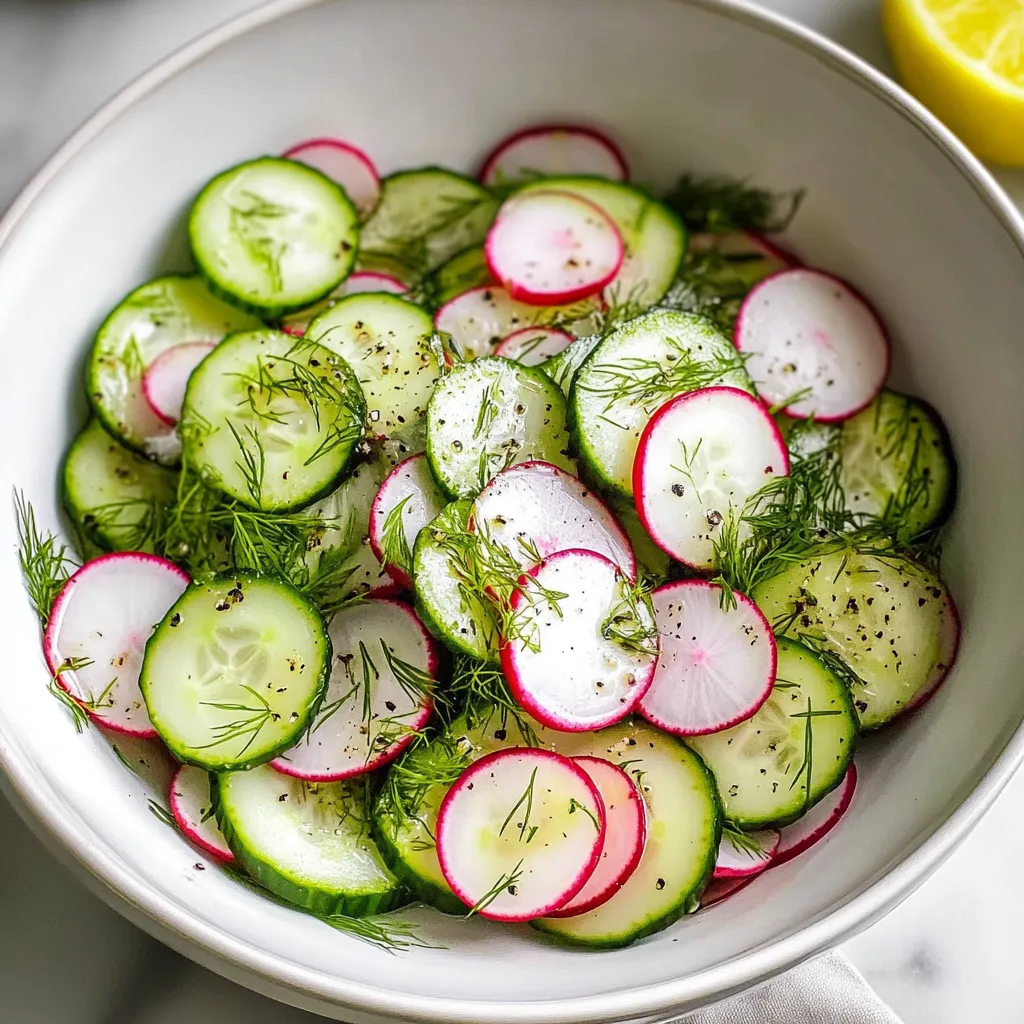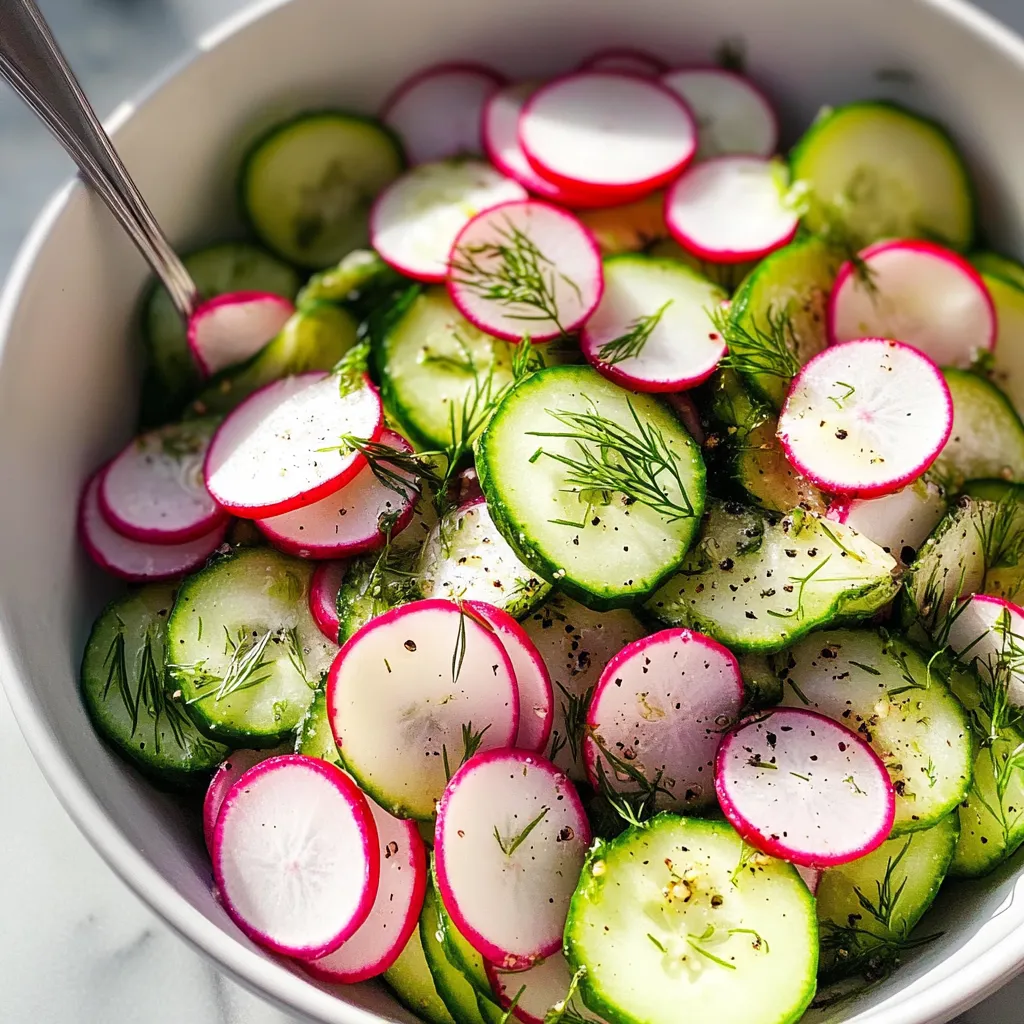 Pin it
Pin it
This vibrant cucumber radish salad delivers incredible freshness with its crisp textures and bright, tangy flavors that make it the perfect antidote to hot summer days or heavy meals. The combination of cool Persian cucumbers, peppery radishes, and aromatic fresh dill creates layers of flavor and texture that are both refreshing and surprisingly satisfying, while the simple lemon-olive oil dressing enhances rather than masks the vegetables' natural taste. Unlike heavy, mayonnaise-based salads that can weigh you down, this light yet substantial dish provides that perfect crisp, clean eating experience that leaves you feeling energized rather than sluggish.
I discovered this combination when I was looking for something refreshing to serve alongside grilled fish and realized how perfectly the peppery bite of radishes complements the cool, mild flavor of cucumbers. The first time I made it, guests kept commenting on how such simple ingredients could taste so fresh and interesting together, and now it's become my go-to summer salad.
Essential Ingredients and Selection Tips
- Persian cucumbers: Choose firm, small cucumbers without soft spots; these mini cucumbers have thinner skins and fewer seeds than English varieties
- Fresh radishes: Select radishes that feel firm and heavy with bright, crisp greens if attached; avoid any that feel spongy or have dark spots
- Fresh dill: Look for bright green fronds without yellowing; dill should smell aromatic and fresh, not musty or wilted
- Green onions: Choose scallions with firm white bottoms and vibrant green tops; both parts contribute different flavor notes
- Fresh lemon juice: Always squeeze your own for the brightest, most vibrant acidity; bottled lemon juice tastes flat in comparison
- Quality olive oil: Use extra virgin olive oil with good flavor since it's a prominent component; the oil should taste fruity and peppery
The secret to perfect texture is slicing everything as thinly and uniformly as possible - a mandoline makes this effortless, but a sharp knife and steady hand work just as well.
Detailed Step-by-Step Instructions
- Step 1: Prepare the vegetables:
- Wash the Persian cucumbers and radishes thoroughly under cold water. Trim the ends from both vegetables but leave the skin on for maximum nutrition and visual appeal. Pat everything dry with paper towels.
- Step 2: Slice with precision:
- Using a mandoline set to its thinnest setting, or a very sharp knife, slice both cucumbers and radishes into paper-thin rounds. Aim for slices that are translucent and uniform - this ensures even flavor distribution and beautiful presentation.
- Step 3: Prepare the aromatics:
- Trim the green onions, removing any wilted or damaged parts. Slice both the white and green portions thinly on the diagonal for the most attractive appearance and best flavor distribution.
- Step 4: Chop the dill:
- Remove the dill fronds from their stems and chop them roughly - you want pieces large enough to provide bursts of flavor but not so large they overpower individual bites.
- Step 5: Make the simple dressing:
- In a small bowl, whisk together the fresh lemon juice, extra virgin olive oil, salt, and freshly ground black pepper until well combined. Taste and adjust the acid-to-oil ratio based on your preference.
- Step 6: Combine carefully:
- In a serving bowl, gently combine the sliced cucumbers, radishes, green onions, and fresh dill. Use your hands or salad tongs to mix gently, being careful not to bruise the delicate vegetables.
- Step 7: Dress at the right time:
- Add the dressing just before serving to maintain maximum crispness. Toss gently to ensure every piece is lightly coated but not drowning in dressing.
- Step 8: Final seasoning:
- Taste and adjust seasoning with additional salt, pepper, or lemon juice as needed. The flavors should be bright, balanced, and refreshing.
- Step 9: Serve immediately:
- Present the salad in a beautiful bowl, garnished with a final sprinkle of fresh dill and a light grinding of black pepper for visual appeal.
 Pin it
Pin it
The most important technique is timing the dressing application - add it too early and the vegetables will become soggy, too late and the flavors won't have time to meld properly.
This salad has become my proof that the simplest combinations often create the most satisfying results when you use quality ingredients and proper technique. My teenage daughter, who usually avoids "healthy" foods, actually requests this salad because she loves the crispy textures and how refreshing it tastes.
Understanding Vegetable Selection and Seasonal Timing
The success of this salad depends heavily on using vegetables at their peak freshness and quality. Persian cucumbers work better than English varieties because their smaller diameter matches radish sizes perfectly, creating visual harmony and consistent bite sizes. Peak season radishes (spring through early summer) have the best balance of peppery bite and crisp texture, while off-season varieties can be woody or overly sharp. Understanding seasonal availability helps you choose the best ingredients for optimal flavor and texture.
Knife Skills and Cutting Techniques
Achieving uniform, paper-thin slices requires either excellent knife skills or the right equipment. A mandoline creates perfectly consistent slices effortlessly, but proper knife technique can achieve similar results. The key is maintaining consistent pressure and angle while keeping fingers safely positioned. Thin slicing isn't just about appearance - it also affects how quickly the vegetables absorb dressing and how the flavors blend in your mouth.
Acid Balance and Flavor Enhancement
The lemon juice serves multiple purposes beyond just adding tartness - it helps preserve the vegetables' color, prevents oxidation, and enhances the perception of freshness. The acid-to-oil ratio in the dressing should complement rather than overpower the delicate vegetable flavors. Too much acid makes the salad harsh, while too little leaves it flat and uninteresting. The goal is bright, balanced flavors that make the vegetables taste more like themselves.
Texture Preservation and Timing
Raw vegetable salads require careful timing to maintain optimal texture. The salt in the dressing begins drawing moisture from the vegetables immediately upon contact, which can create unwanted sogginess if left too long. However, some brief contact time allows flavors to penetrate and meld. Understanding this balance helps you achieve the perfect serving consistency - crisp vegetables with well-integrated flavors.
Flavor Pairing and Herb Integration
Dill's bright, aromatic quality makes it the perfect complement to both cool cucumbers and peppery radishes. Its slightly tangy, grassy notes bridge the gap between the mild cucumber and assertive radish flavors while adding its own complexity. Fresh herbs should be added just before serving to maintain their color and prevent wilting, while their oils need a few minutes to release and integrate with the other flavors.
This cucumber radish salad has taught me that some of the most refreshing and satisfying dishes come from understanding how to combine simple, high-quality ingredients in ways that highlight their best natural qualities. Every time I make it, I'm reminded that good cooking isn't always about complexity - sometimes it's about perfect technique applied to perfect ingredients at the perfect time.
Frequently Asked Questions
- → How long does this salad stay fresh?
- This salad is best eaten right away, but you can store it in the fridge for up to 2 days. The vegetables may release some water over time.
- → Can I make this salad ahead of time?
- You can prep the vegetables a few hours early, but add the dressing right before serving to keep everything crisp.
- → What can I use instead of radishes?
- Try thinly sliced red onion, cherry tomatoes, or even thin slices of red bell pepper for different flavors and colors.
- → Do I need a mandoline to make this?
- No, a sharp knife works perfectly fine. A mandoline just makes the slicing faster and more uniform, but it's not required.
- → Can I add other herbs to this salad?
- Yes! Fresh mint, parsley, or chives would all taste great. Use whatever herbs you have on hand or prefer.
- → Is this salad good for meal prep?
- It's better eaten fresh, but you can prep components separately and combine them when ready to eat for best results.
